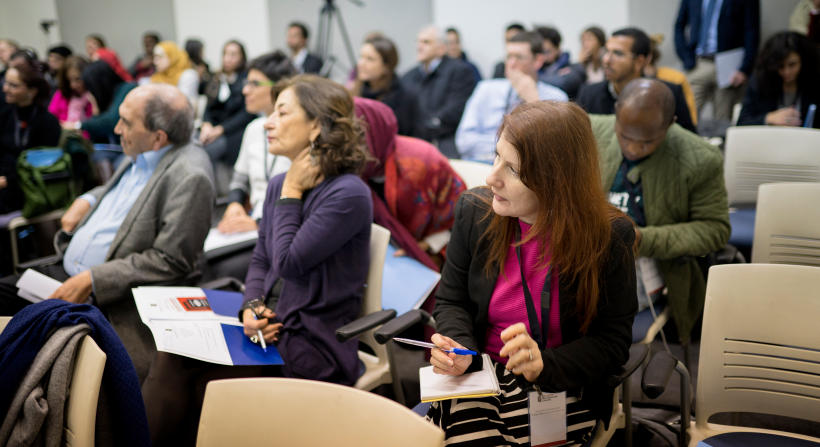Dart Center Trainings: What Newsrooms Say

The Dart Center for Journalism and Trauma provides customized training and consultation services around the U.S. and worldwide to newsrooms and organizations engaged in related work. Led by senior Dart Center-affiliated journalists and mental-health professionals, virtual and in-person training offerings range from overall trauma awareness, self-care and resilience programs to workshops on specific skills such as trauma-informed interviewing and managing online harassment. For additional information on Dart Center training and consultation services, visit our trainings page. To set up a session, or to get more information about how we can help your team, contact [email protected].
"Because of Our Work With Dart..."
"The Dart Center provides extraordinary support for our photography and social justice fellows, young photographers who come from around the world who make visual stories that address serious social issues. The workshop they run for our fellows gives them a framework for how to care for themselves and support each other through the course of their work on the fellowship and beyond. They learn strategies that foster resilience and that normalize reflective practice. The workshops they offer always give fellows the sense their challenges are valid and that they are seen and heard. The resources that Dart publishes are also useful for our fellows and grantees; I often forward them along as reference points for photographers who are embarking on projects that involve trauma." — Emma Raynes, Director of Programs, MAGNUM FOUNDATION
"Our partnership with the Dart Center has led to better outcomes for hundreds of journalists around the country. As a result of our work together, our journalists have a far better understanding of how their important work can affect their mental health — and, vitally, how anyone (regardless of rank or stature) can be a huge healing help to anyone else. We are a more empathetic organization because of our work with Dart. Our journalism, and our relationships with our communities, are better because of it." — Mackenzie Warren, Senior Director, Training and career development, USA TODAY NETWORK / GANNETT
"Bruce and the team at the Dart Center have been phenomenal partners for us at The Philadelphia Inquirer. On more than one occasion Dart has helped to guide our leaders on ways to incorporate trauma-informed practices and techniques to better support our journalists and teams. They have helped our leaders to navigate through difficult moments that made us more effective and impactful in all ways of management." — Jameel Rush, Vice President, Diversity, Equity, and Inclusion, THE PHILADELPHIA INQUIRER
"Our team welcomed the trauma training from The Dart Center. As journalists they related easily to Bruce and appreciated advice shared by a thoughtful, experienced fellow journalist. Bruce’s insights helped reassure our team that trauma is real and that they should not be ashamed to ask for help and support from friends and colleagues in the organization." — Julianne Markow, VOICE OF SAN DIEGO
"Dart Center trainings in our newsroom have given our managers a better understanding of journalists' mental health risks, and the vocabulary and tactics they need to discuss it. Most importantly, our newsroom leaders understand that these challenges can be dealt with — that they are not by default career-enders." — Kate Ortega, Assistant Managing Editor, Operations, THE WALL STREET JOURNAL
"As someone working with the ACLU affiliates around Leadership Development, Organization Development and Culture, it was my pleasure to work with the Dart Center around trauma and resilience in social justice organizations. We started out with a nationwide webinar where we invited all 2,000 staff to attend and gave a snippet of the work the Dart Center does. We evolved from there to make regional trainings with 50 staff at a time. These happen at the onset of Covid and during the last administration. Those two factors combined created a traumatic and very difficult environment for staff who are used to soldiering through any difficulties to preserve our civil liberties. Being able to sit down and hear that there was in fact trauma associated with the work that we do and that they deserved to care for themselves if they wanted to be better guardians of civil liberties. Bruce delivered trainings that resonated, were science-based but also validated the various feelings that participants had. We continue to work with his team and think they are a valuable resource to any team that cares about the mental wellbeing of its staff." — Tata Traore-Rogers, ACLU
"The Dart Center training helped our team build our understanding of the role of secondary trauma as a potential harm to the journalists in our newsroom. It helped us understand how newsroom leaders could structurally think about supporting people who report and edit coverage of upsetting events and how we can normalize the need for recovery and rest. It’s been key in building our common vocabulary around trauma in journalism." — Vinnee Tong, Managing Editor and Director, News, KQED
































































































